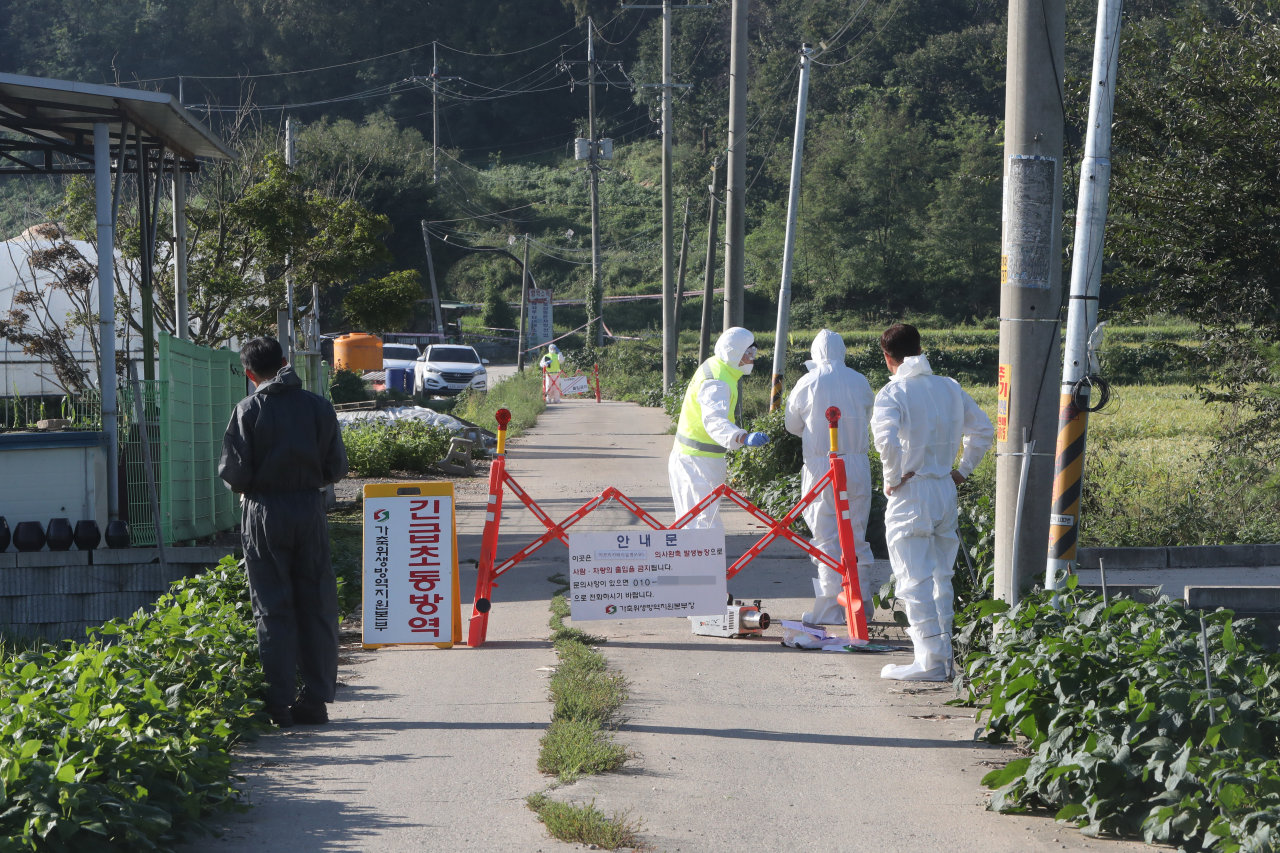South Korea rushes to stem spread of African swine fever
Nation on emergency mode after the outbreak of 1st case in Paju near inter-Korean border
By Kim Yon-sePublished : Sept. 17, 2019 - 16:36
SEJONG -- South Korean authorities Tuesday quarantined employees of hog-raising farms until Thursday morning in the aftermath of an outbreak of African swine fever.
The deadly ASF virus was detected at a farm in Paju, Gyeonggi Province, which is located between Seoul and Kaesong, North Korea, early in the day, according to the Ministry of Agriculture, Food and Rural Affairs.
ASF is a highly contagious hemorrhagic fever in pigs and can be spread via fomites and uncooked pig products. The disease has up to 100 percent mortality rates for the livestock.
While some industry insiders raised the possibility it could be due to the close proximity of the inter-Korean border city to the North, where the outbreak of the virus was reported in May, the ministry said it has yet to confirm it.
Agriculture Minister Kim Hyeon-soo told a news briefing that the government has raised the alert to the highest level, saying that 3,950 hogs at the farm in Paju would be culled to manage, contain and control the spread of the disease.
He said that the government has imposed a quarantine across the country on hog farm-related employees and vehicles. Among the targets are people working at hog farms, veterinarians and animal feeddelivery workers.
The deadly ASF virus was detected at a farm in Paju, Gyeonggi Province, which is located between Seoul and Kaesong, North Korea, early in the day, according to the Ministry of Agriculture, Food and Rural Affairs.
ASF is a highly contagious hemorrhagic fever in pigs and can be spread via fomites and uncooked pig products. The disease has up to 100 percent mortality rates for the livestock.
While some industry insiders raised the possibility it could be due to the close proximity of the inter-Korean border city to the North, where the outbreak of the virus was reported in May, the ministry said it has yet to confirm it.
Agriculture Minister Kim Hyeon-soo told a news briefing that the government has raised the alert to the highest level, saying that 3,950 hogs at the farm in Paju would be culled to manage, contain and control the spread of the disease.
He said that the government has imposed a quarantine across the country on hog farm-related employees and vehicles. Among the targets are people working at hog farms, veterinarians and animal feeddelivery workers.

Under the ban, the employees and vehicles must stay at the farms or processing facilities, where they were working as of 6:30 a.m. for 48 hours until the same time Thursday. In addition, the industry-related vehicles operating at that time have been ordered to move to other safe locations.
Rule-violators could be subject to a jail term of up to one year or a fine of up to 10 million won ($8,400).
“Given the incubation period of ASFV, the coming week or so is the most dangerous,” said Minister Kim. “(The government and quarantine authorities) will go all out to prevent it from spreading.”
As a countermeasure, the ministry said it would undertake a preemptive scrutiny of 6,300 hog farms nationwide.
In addition, to block the epidemic from spreading, farms and delivery services in Gyeonggi Province have been barred from transporting pigs to other cities or provinces for a week.
Though quarantine experts said there had been no case of a person infected by the virus in foreign countries, some doctors have advised consumers to eat sufficiently cooked pork for safety.
Prime Minister Lee Nak-yon expressed concern in a press release noting that “its spread (if any) could deal a severe blow to the local hog raising industry, as there are no curative means or vaccines (to protect pigs).”
He also called on all residents to cooperate with the state-led efforts to head off the irregular influx of livestock products here.
Meanwhile, the Korea Agro-Fisheries & Food Trade Corp. is poised to closely monitor pork consumer prices in consideration of the price spike in China, where the outbreak of ASF was reported recently.
By Kim Yon-se (kys@heraldcorp.com)







![[Graphic News] More Koreans say they plan long-distance trips this year](http://res.heraldm.com/phpwas/restmb_idxmake.php?idx=644&simg=/content/image/2024/04/17/20240417050828_0.gif&u=)
![[KH Explains] Hyundai's full hybrid edge to pay off amid slow transition to pure EVs](http://res.heraldm.com/phpwas/restmb_idxmake.php?idx=644&simg=/content/image/2024/04/18/20240418050645_0.jpg&u=20240419100350)





![[From the Scene] Monks, Buddhists hail return of remains of Buddhas](http://res.heraldm.com/phpwas/restmb_idxmake.php?idx=652&simg=/content/image/2024/04/19/20240419050617_0.jpg&u=20240419175937)

![[KH Explains] Hyundai's full hybrid edge to pay off amid slow transition to pure EVs](http://res.heraldm.com/phpwas/restmb_idxmake.php?idx=652&simg=/content/image/2024/04/18/20240418050645_0.jpg&u=20240419100350)

![[Today’s K-pop] Illit drops debut single remix](http://res.heraldm.com/phpwas/restmb_idxmake.php?idx=642&simg=/content/image/2024/04/19/20240419050612_0.jpg&u=)